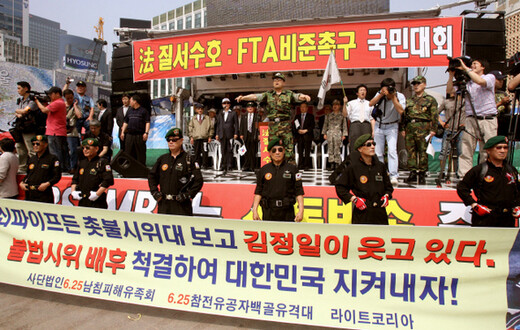hankyoreh
Links to other country sites 다른 나라 사이트 링크
S. Korea’s policy on North becoming tougher

President Lee Myung-bak’s policy on North Korea has been affected and changed by the candlelight vigils. However, the direction of the change is the exact opposite of the will of people who have participated the candle vigils.
A source close to the government’s internal affairs said on June 20, “The recent mood related to North Korean policy at Cheong Wa Dae is becoming tougher and more conservative.” “As approval ratings for the president fell to some 10 percent, there is a move to overcome the situation by uniting conservatives. The lynchpin of a grand alliance of conservatives is ‘anti-North Korea,’” the source said.
There have been several signs that the presidential office was becoming tougher and more conservative on North Korean policy. Unification Minister Kim Ha-joong’s attendance at a ceremony on June 12 to mark the eighth anniversary of the June 15 Joint Declaration had been a source of controversy among top presidential aides until the morning of June 12.
After the unification ministry let the media know about Kim’s plan to attend the ceremony on June 10 and 11, then-presidential chief of staff Ryu Woo-ik, the ruling Grand National Party’s chief policymaker Lim Tae-hee and GNP secretary-general Kwon Young-se told the unification minister not to attend the ceremony. They opposed the unification minister’s attendance, saying “The situation is already difficult because of candlelight demonstrations. Why are you trying to make the situation worse?”. “They seemed to have worried that minister Kim’s attendance at the June 15 event could stir up a backlash from conservative supporters who have a strong anti-North sentiment,” the source said.
Last month, the unification ministry declared its proposal to send 50,000 tons of corn aid to North Korea via a liaison channel at Panmunjom. However, the aid proposal was approved by President Lee in a difficult situation due to the uncomfortable and stubborn attitude at Cheong Wa Dae. For the approval, the unification minister held a one-on-one meeting with President Lee. As a result of the intervention by hawkish officials at Cheong Wa Dae, the unification ministry proposed a meeting with North Korea to seek a response on the corn aid through a virtually unofficial channel of sending a message to liaison officials at Panmunjom. So far, South and North Korean authorities have exchanged proposals to hold an official discussion and also other important offers have been made through a telephone message, which clarifies a sender and a receiver, or a face-to-face meeting of liaison officials.
Still, North Korea has not yet responded to the South’s food aid proposal. A former senior official in the field of diplomacy and security said, “Sending a ‘message to a Panmunjom liaison official’ is nothing but an unofficial way of seeking a response. With inter-Korean relations turned sour, it would be difficult to expect the North to respond, after regarding it as an official proposal.”
Amid such a mood and candlelight rallies entering their 50th day on June 20, a glimmer of hope to find ways to improve inter-Korean relations inside the South’s government was fading, hit by the tougher stance on North Korea at Cheong Wa Dae. A government official said, “It will likely take some time (to normalize inter-Korean relations).”
Please direct questions or comments to [englishhani@hani.co.kr]
Editorial・opinion
![[Guest essay] Preventing Korean Peninsula from becoming front line of new cold war [Guest essay] Preventing Korean Peninsula from becoming front line of new cold war](https://flexible.img.hani.co.kr/flexible/normal/500/300/imgdb/original/2024/0507/7217150679227807.jpg) [Guest essay] Preventing Korean Peninsula from becoming front line of new cold war
[Guest essay] Preventing Korean Peninsula from becoming front line of new cold war![[Column] The state is back — but is it in business? [Column] The state is back — but is it in business?](https://flexible.img.hani.co.kr/flexible/normal/500/300/imgdb/original/2024/0506/8217149564092725.jpg) [Column] The state is back — but is it in business?
[Column] The state is back — but is it in business?- [Column] Life on our Trisolaris
- [Editorial] Penalties for airing allegations against Korea’s first lady endanger free press
- [Editorial] Yoon must halt procurement of SM-3 interceptor missiles
- [Guest essay] Maybe Korea’s rapid population decline is an opportunity, not a crisis
- [Column] Can Yoon steer diplomacy with Russia, China back on track?
- [Column] Season 2 of special prosecutor probe may be coming to Korea soon
- [Column] Park Geun-hye déjà vu in Yoon Suk-yeol
- [Editorial] New weight of N. Korea’s nuclear threats makes dialogue all the more urgent
Most viewed articles
- 1Behind-the-times gender change regulations leave trans Koreans in the lurch
- 2Yoon’s revival of civil affairs senior secretary criticized as shield against judicial scrutiny
- 3South Korean ambassador attends Putin’s inauguration as US and others boycott
- 4Family that exposed military cover-up of loved one’s death reflect on Marine’s death
- 5Hybe-Ador dispute shines light on pervasive issues behind K-pop’s tidy facade
- 6[Guest essay] Preventing Korean Peninsula from becoming front line of new cold war
- 7[Editorial] New weight of N. Korea’s nuclear threats makes dialogue all the more urgent
- 8‘Weddingflation’ breaks the bank for Korean couples-to-be
- 9Yoon’s broken-compass diplomacy is steering Korea into serving US, Japanese interests
- 10U.S. band that performed in N. Korea looking forward to going back